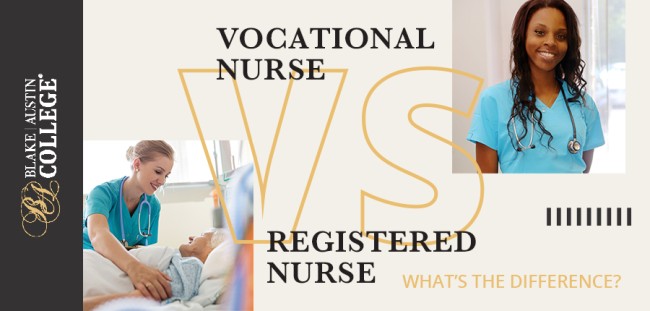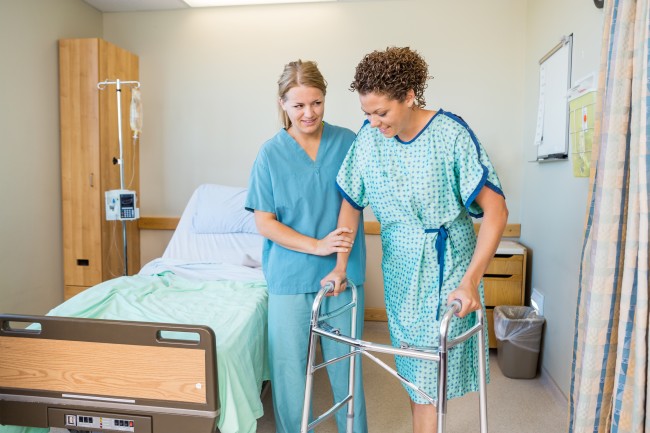Vocational Nurse vs Registered Nurse: What’s the Difference?
 Entering the medical industry is an amazing goal for your career. If you’re thinking of heading this route, you’ve most likely been through your options of what you want to do. To work in healthcare, you’ll need to go to school, train, and earn your license in your respective field. Nursing is a great career choice, but there are many different types of nurses that have different requirements for licensing and practicing. Licensed Vocational Nurses and Registered Nurses are two of the most common types, but can seem very similar. This makes it hard to discern which one is right for you.
Entering the medical industry is an amazing goal for your career. If you’re thinking of heading this route, you’ve most likely been through your options of what you want to do. To work in healthcare, you’ll need to go to school, train, and earn your license in your respective field. Nursing is a great career choice, but there are many different types of nurses that have different requirements for licensing and practicing. Licensed Vocational Nurses and Registered Nurses are two of the most common types, but can seem very similar. This makes it hard to discern which one is right for you.
So, what’s the difference? Keep reading to find out!
Licensed Vocational Nurse
A licensed vocational nurse (LVN) cares for disabled, sick, or injured patients. These nurses are typically trained on basic patient care like vital sign monitoring, IV therapy, wound treatment, patient comfort, and more. Under the supervision of a registered nurse or doctor, an LVN provides bedside care for patients.
Registered Nurse
Registered nurses (RN) oversee LVNs, nursing assistants, and other healthcare aids. They can provide more advanced care than an LVN and work with other doctors on best ways to treat patients. RNs can diagnose and educate patients on medical issues and treatments, and give advanced IV therapy.

What’s the Difference?
Typically, RNs are higher level nurses than LVNs. A major difference between the two nurses is that vocational nurses work under the supervision of registered nurses, and require less formal training. They perform similar tasks, but an LVN is typically not given the same responsibilities as an RN.
What Education and Licensing is Required?
Something that separates vocational nurses from registered nurses is the educational path and licensing requirements. To become a registered nurse, 2-4 years of education is required to practice. Your education options are limited to a diploma or degree from a college or university. RNs must pass the National Council Licensure Examination to be qualified to practice.

To become a vocational nurse, less schooling is required. Most programs take about a year to complete, with a diploma or certificate in practical nursing as the end goal. People can enroll in courses through community colleges and vocational schools, where they can receive hands-on experience. There are several individual certification programs that vocational nurses can pursue: These include:
- Wound Care
- Hospice
- Long-Term Care
- Nephrology
- And more!
While vocational nurses may not have as many responsibilities as registered nurses, they still have many options available to them. At Blake Austin College, our vocational nursing program prepares students with the knowledge and skills necessary to be an effective health care team member in a variety of practice settings.
What are Their Responsibilities?
RNs and LVNs have fairly similar duties in patient care. However, LVNs must typically get approval from an RN or qualified medical professional before they can make any decisions about a patient’s treatment. Whereas RNs can work independently.
Registered nurses are often put in leadership positions and are in charge of making their patients comfortable. They use their knowledge to provide the care that they feel is needed through various assessments, medications, and treatments. RNs can advise patients on illness management, consult other healthcare professionals, and analyze testing results. Vocational nurses often assist RNs with these tasks by:
- Monitoring vital signs
- Communicating readings to doctors and nurses
- Changing dressings
- and more

Where Can They Work?
Another way these two types of nurses differ is in their career options. Registered nurses and vocational nurses often work alongside each other, but their work environments usually vary. As an LVN, you can work in places like:
- General medical hospitals
- Blood banks
- Doctors’ offices
- Outpatient clinics
- and other similar locations
As an RN, you can work in these places and more. You can work in schools, government agencies, correctional facilities, and more as their healthcare professional. While the jobs and responsibilities of these nurses are different, both types are equally important in providing high quality healthcare to their patients.
Pursue Healthcare with Blake Austin College

We, at Blake Austin College, have been a leader in the healthcare industry by providing students with the hands-on training and skills they need to be successful, through our healthcare education. We encourage a learning environment that promotes self-discipline, motivation, and excellence. Our Vocational Nursing program offers a comprehensive learning experience that simulates the clinical environment of the real world.
If you’re ready to pursue an education in the medical industry, contact us today to get started or visit our website to learn more about our various programs, admissions process, or read our blog!
